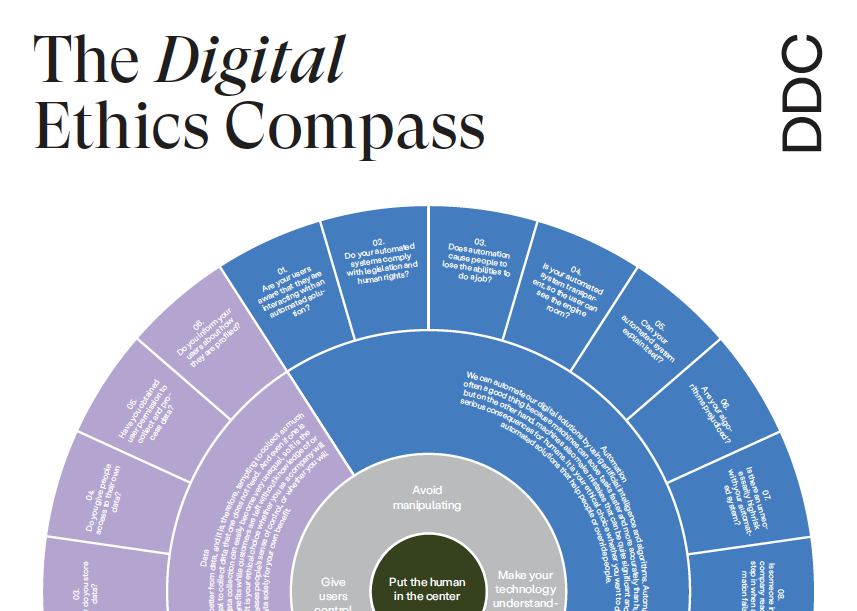
Image by DDC | The Digital Ethics Compass
The Digital Ethics Compass
09/10/24The Digital Ethics Compass is a tool to help companies make the right decisions from a design ethical standpoint.
We’ve all heard the stories of big tech collecting uncanny amounts of personal data, using cunning algorithms to manipulate our brains, or even hiring neuro specialists to make us addicted to digital products. Scary as they may be, they can seem irrelevant or far from the work lives of the digital designers and product developers who don’t work for Facebook, Google, or Amazon.
The reality is that many of these stories start with a reasonably ordinary designer who makes everyday design decisions. Wanting to design the best possible solution is understandable, but in that pursuit digital solutions can have unintended consequences. Vulnerable audiences, user data or the far-reaching consequences – these, and many more, are all considerations we need to take when designing digital solutions if we are to create a better, fairer, more responsible, and ethical digital world.
To do that, we need to start with the design decisions that designers, product managers and programmers make every day. Decisions that ultimately impact the company’s image, competitiveness, and growth. In short, it’s a matter for top management and the Digital Ethics Compass toolkit is here to help.
The kit is available for free by courtesy of the Danish Design Center.
The tool has been visited almost 18,000 times on ddc.dk and presented in Australia, the Philippines, Japan, the Netherlands, and Sweden, as well as to visitors from Israel, Palestine, Singapore, and Germany. Most recently, Minister of Digitalization Marie Bjerre (V) presented the first Data Ethics Award in connection with the Digital Future Innovation Challenge. An event that engaged Danish companies and students across design courses.
The tool has two features:
- The Digital Ethics Compass (heuristics): The compass helps you ask the right ethical questions to avoid the most common design mistakes. Ethical design patterns guide you with practical recommendations and examples of how to create ethical digital products.
- Ethical workshop: Build more ethical and responsible products with the workshop tool. You’ll be guided through a workshop, designed to help you locate any ethical problems with your digital products or services and find new and more ethical solutions.
The Digital Ethics Compass (heuristics)
You can explore the full experience of The Digital Ethics Compass at the DDC website and also use it as an ethical checklist. You can also download the compass and knowledge cards as PDFs.
The Ethics Navigator is a checklist that helps you ask ethical questions about your digital solutions and designs. You can use it to quickly get answers to ethical questions, but it can also be included as a working tool in workshops or design courses where you want to ensure that ethics are involved in the development of the digital solution.
In the middle of the Ethics Navigator, you will find the five basic principles of responsible and ethical digital design. You should memorize them and always keep them in mind when working with digital solutions. All five principles are explained by an in-depth knowledge card.
In the outer ring of the Ethics Navigator, you will find 22 ethical questions which are divided into the three categories of data, automation, and behavioral design. The questions try to challenge you to think ethics and responsibility into your digital designs. It is far from all the questions that will be relevant to your solution, but there will almost always be at least a few questions that can challenge you and set thoughts in motion. For each of the 22 questions, you will find an associated knowledge card, which elaborates on the meaning of the question, which provides concrete design recommendations, and which describes a good and a bad example from the real world.
Ethical workshop: An extended course
The Digital Ethics Compass can also be combined with a more comprehensive course run by the consulting partners who helped develop the Ethics Compass. A course lasts 1-3 days and tackles more broad issues about design ethics and how to be better at designing ethically. The course is tailored to company needs, but to give you an example, here’s what a program might look like:
- An interview or a survey assessing the company’s digital products and the organization’s maturity concerning digital design.
- Preparation: Participants spend approximately one hour preparing.
- Day 1: Introduction to ethics and digital design ethics with hands-on and engaging examples.
- Day 2: Workshop based on The Digital Ethics Compass. Moderated by an experienced consultant with deep knowledge of the tool and design issues.
- Day 3: How do we get better at working with digital design ethics in our daily work? How do we change the organization? How do we change our processes? Etc.
- Follow-up: The course is followed up with interviews and assessments.
Invite all those who make or impact decisions about the design of a digital product in the workshop. Designers, product managers, programmers, data scientists, CEOs, business developers, etc. – it’s an advantage to have as interdisciplinary a team of participants as possible, as it supports seeing the product from different perspectives.
Download the PDFs to use the Digital Ethics Compass as a workshop tool and watch the introductory vide on the DDC website.
More Information: ddc.dk/tools/toolkit-the-digital-ethics-compass
